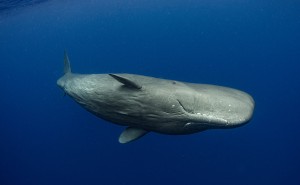University of Haifa has embarked on an ambitious new global research project that hopes to understand how to decipher sperm whale communication, which may even enable humans to understand the dialogue between these large sea creatures.
The University has joined forces with other prestigious institutions such as The City University of New York (CUNY), Harvard University, Massachusetts Institute of Technology (MIT), Imperial College London, U.C. Berkeley and others. This week, at a press conference held in Dominica in the Caribbean – where the project will take place – researchers revealed plans for what they are calling the Cetacean Translation Initiative (CETI).
The multidisciplinary project is estimated to last at least five years and will combine expertise from several different fields of study including: marine biology, marine acoustics, artificial intelligence, linguistics and more. Researchers will leverage state-of-the art machine learning and non-invasive robotics to listen and translate the sperm whales’ language and even attempt to talk back to the majestic creatures.
“These primates make a clicking sound at varying frequencies when they are in the company of other whales. The question is, is this just a simple code or a true language? Right now, our database is not comprehensive enough to know the answer to this question. However, with the advancement of machine learning, and advanced linguistics, we realized that if we gathered enough data about their voices, the context in which these sounds are employed and understood and their behavior and motivation behind these sounds, we can then develop an algorithm which will determine whether they have an authentic language,” said one of the leaders of the project, Prof. Dan Tchernov of University of Haifa’s Leon H. Charney School of Marine Sciences and Scientific Director of The Morris Kahn Marine Research Station.
“Of course, the dream would be if we are able to communicate with them, on their terms” he added.
The potential implications should this project prove successful are numerous since the biodiversity of the planet is quickly dwindling. As such, it is urgent for humans to find a way to coexist with the creatures that remain on earth.
“The sperm whale is the animal with the largest brain, and like humans, it has a complex communication system and lives in tightly knit family groups. These whales also help keep carbon out of the atmosphere, support our oxygen supply, and increase marine life. We now have the tools to identify and translate the deep structure of their communicative patterns and to kickstart the path towards meaningful dialogue with another species. By illustrating whales’ incredible intelligence and advocating for legislation, we can accelerate conservation efforts,” Project CETI’s official websiteexplains.
Leading the project is Prof. David Gruber, Presidential Professor of Biology and Environmental Science at City University of New York, along with Dr. Shane Gero, a National Geographic explorer and an expert in whale biology who has investigated Dominica sperm whales for over a decade, who will work with Prof. Tchernov, serving as the project’s operational director. Other researchers involved include University of University of California, Berkeley and MIT Prof. Shafi Goldwasser, and Harvard University’s Robotic Program Director, Prof. Rob Wood.
Also part of the University of Haifa team are Dr. Roee Diamant of the Marine Sciences Department, who will be the project’s lead acoustic adviser and in change of placing the world’s most advanced marine mammal listening and localization array, and Dr. Bracha Nir, Head of the University’s Department of Communication Disorders, who will investigate mother and calf communication themes.
“The participation of three researchers from University of Haifa in this prestigious research project alongside the world’s leading scientists from Harvard, MIT and Berkeley, testifies to the extensive work being done at the University and the School of Marine Sciences in particular,” said Prof. Ron Robin, President of University of Haifa.
Photo 1: Female sperm whale (Credit: Amanda Cotton)
Photo 2: Three Sperm whale calves (Credit: Amanda Cotton)
Photo 3: Project CETI Ecosystem Illustration (Credit: Alex Boersma)



















